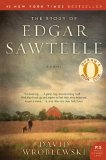Summary | Excerpt | Reading Guide | Reviews | Beyond the Book | Readalikes | Genres & Themes | Author Bio

A Novel
by David WroblewskiPart I
Forte's Children
A Handful of Leaves
In the year 1919, Edgar’s grandfather, who was born with
an extra share of whimsy, bought their land and all the buildings on
it from a man he’d never met, a man named Schultz, who in his turn had
walked away from a logging team half a decade earlier after seeing the
chains on a fully loaded timber sled let go. Twenty tons of rolling maple
buried a man where Schultz had stood the moment before. As he helped
unpile logs to extract the wretched man’s remains, Schultz remembered
a pretty parcel of land he’d spied north and west of Mellen. The morning
he signed the papers he rode one of his ponies along the logging road to
his new property and picked out a spot in a clearing below a hill and by
nightfall a workable pole stable stood on that ground. The next day he
fetched the other pony and filled a yoked cart with supplies and the three
of them walked back to his crude homestead, Schultz on foot, reins in
hand, and the ponies in harness behind as they drew the cart along and
listened to the creak of the dry axle. For the first few months he and the
ponies slept side by side in the pole shed and quite often in his dreams
Schultz heard the snap when the chains on that load of maple broke.
He tried his best to make a living there as a dairy farmer. In the five
years he worked the land, he cleared one twenty-five-acre field and drained
another, and he used the lumber from the trees he cut to build an out-
house, a barn, and a house, in that order. So that he wouldn’t need to go
outside to tote water, he dug his well in the hole that would become the
basement of the house. He helped raise barns all the way from Tannery
Town to Park Falls so there’d be plenty of help when his time came.
And day and night he pulled stumps. That first year he raked and har-
rowed the south field a dozen times until even his ponies seemed tired of
it. He stacked rocks at the edges of the fields in long humped piles and
burned stumps in bonfires that could be seen all the way from Popcorn
Corners - the closest town, if you called that a town - and even Mellen.
He managed to build a small stone-and-concrete silo taller than the barn,
but he never got around to capping it. He mixed milk and linseed oil and
rust and blood and used the concoction to paint the barn and outhouse
red. In the south field he planted hay, and in the west, corn, because the
west field was wet and the corn would grow faster there. During his
last summer on the farm he even hired two men from town. But when
autumn was on the horizon, something happened - no one knew just
what - and he took a meager early harvest, auctioned off his livestock
and farm implements, and moved away, all in the space of a few weeks.
At the time, John Sawtelle was traveling up north with no thought or
intention of buying a farm. In fact, he’d put his fishing tackle into the
Kissel and told Mary, his wife, he was delivering a puppy to a man he’d
met on his last trip. Which was true, as far as it went. What he didn’t
mention was that he carried a spare collar in his pocket.
That spring their dog, Violet, who was good but wild-hearted, had
dug a hole under the fence when she was in heat and run the streets with
romance on her mind. They’d ended up chasing a litter of seven around
the backyard. He could have given all the pups away to strangers, and
he suspected he was going to have to, but the thing was, he liked hav-
ing those pups around. Liked it in a primal, obsessive way. Violet was
the first dog he’d ever owned, and the pups were the first pups he’d
ever spent time with, and they yapped and chewed on his shoelaces and
looked him in the eye. At night he found himself listening to records and
sitting on the grass behind the house and teaching the pups odd little
tricks they soon forgot while he and Mary talked. They were newlyweds,
or almost. They sat there for hours and hours, and it was the finest time
so far in his life. On those nights, he felt connected to something ancient
and important that he couldn’t name.
Excerpted from The Story of Edgar Sawtelle by David Wroblewski Copyright © 2008 by David Wroblewski. Excerpted by permission of Ecco, a division of Random House, Inc. All rights reserved. No part of this excerpt may be reproduced or reprinted without permission in writing from the publisher.




Every good journalist has a novel in him - which is an excellent place for it.
Click Here to find out who said this, as well as discovering other famous literary quotes!
Your guide toexceptional books
BookBrowse seeks out and recommends the best in contemporary fiction and nonfiction—books that not only engage and entertain but also deepen our understanding of ourselves and the world around us.